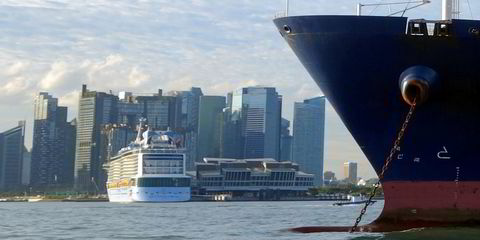Yemen's Houthi rebels targeted yet another commercial vessel in the Red Sea on 16 February.
A “large number of... naval missiles” was fired against the 100,000-dwt LR2 product tanker Pollux (built 2003), the Houthis' military spokesman said in a statement.
US Central Command (Centcom) clarified in a social media post on 17 February that the Houthis fired four anti-ship ballistic missiles, at least three of which targeted the Pollux.
UK maritime authorities and security firms had reported earlier on 16 February about an attempted strike against an unidentified, Panama-flagged tanker at 1331 GMT, about 70 nautical miles (130 km) north of Mokha, Yemen.
“The master reports vessel was attacked by a missile and reports an explosion in close proximity,” the United Kingdom Maritime Trade Operations said in a social media post.
“Military authorities are responding.”
The vessel and crew, however, are unharmed.
According to Ambrey Analytics and a US official, the ship sustained minor damage on its port side.
The Houthi rebel group, which controls large swathes of Yemen, has attacked more than 50 vessels since November, as part of a campaign to pressure Israel to stop the war it is waging in Gaza.
The group’s declared targets are ships linked or trading with Israel, or belonging to companies in the US and the UK, because American and British forces have been striking the Houthis in retaliation for their attacks on shipping.
Not all ships attacked by the Houthis, however, fit neatly into this description. The Pollux is one example of that, which seems to have confused both the Houthis and US authorities.
The Houtis described the Pollux as a “British oil ship”. That is probably because shipping data banks, such as S&P Global, list a UK-controlled entity called Oceanfront Maritime SA as the vessel’s registered owner.
The Pollux, however, is managed and most probably ultimately owned by Athens-based Sea Trade Marine, a company linked to Greek owner Panagis Zissimatos.
The ship was owned until August 2022 by Denmark-based Torm, which used to trade it as Torm Ingeborg.
Its previous Torm ownership is probably the reason why Centcom in its statement on Saturday described the Pollux as a “Denmark-owned” vessel.
Torm, however, already announced that it has sold the ship, which no longer features anywhere on the company's fleet list.
According to vessel tracking data, the Pollux is currently carrying a cargo of Russian blend from Novorossyisk in the Black Sea to Paradip, India. Its AIS signal indicates the vessel as having no connection with Israel.
As of 1409 GMT on Saturday, the Pollux was sailing at a speed of 13.6 knots through the Gulf of Aden — much further south from where it had been attacked the day before.
Transits sharply down
The Houthis’ campaign has been highly effective in disrupting traffic through the Red Sea and the Suez Canal.
According to PortWatch, a website run by the International Monetary Fund in partnership with the University of Oxford, the seven-day moving average of ship transits through the waterway dropped to 41 on 13 February, down from 75 two months ago.
The latest attack came one day after a rocket landed close to Helikon Shipping Enterprises’ 58,800-dwt Lycavitos (built 2007) in the Gulf of Aden.
The bulker, which belongs to London Greek interests, changed course and did not enter the Red Sea.






